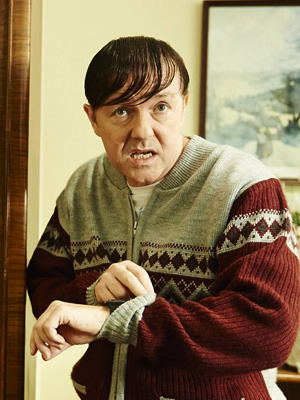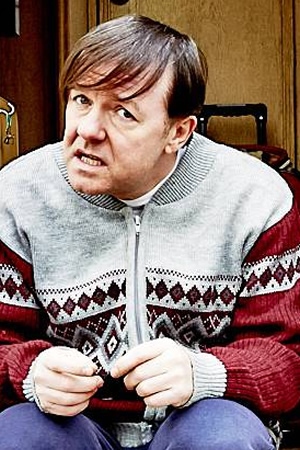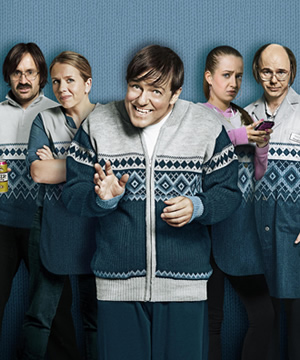Ricky Gervais interview


Ahead of the second series, Ricky Gervais talks about the return of his character...
Hi Ricky. What more do we find out about Derek in this series?
You learn that Derek is fun. Also you discover that he is not just sweet and selfless and funny, but also really wise. He's got it spot on with his strategy. He knows that if you always do the right thing, the kindest thing, you can't go far wrong. I don't know if Derek's example can change anything, but at least it might make people think a bit. On Twitter last year people wrote, "I called my nan after watching Derek." That makes me well up.
What do you think the message of Derek is?
Derek is a show about kindness. It shows that kindness trumps everything. I made the characters look like life's losers so I could pull the rug from under viewers. I don't want them to see it coming. I want people to be laughing at Kev, and then when he begs for his job back, I want them to see that he's got real feelings.
What other themes does the show throw up?
It shows that women are the real role models in life. Men think they rule, but women actually rule, without having to show off about it. I've never liked the idea of women as props or air-heads or seductresses or super-bitches. Where are the real women in comedy and drama? The character of Hannah is based on women in my family.
They are nurturing and care about babies and puppies, but they've also lionesses. They would take a baseball bat to someone in order to protect their family. Hannah is a conglomerate, a Frankenstein's monster of working-class women I have known. They are always prepared to take responsibility for things. My mum had to bring up four kids, but she also knitted, sewed and did the wallpapering. She made no money go a long way. Most women are like that.
How much of Derek is drawn from your own life?
I have always written about what I know. I worked in an office for 10 years before I wrote The Office. The character of Gareth was based on someone I knew at school - that's why he's like a 14-year-old. Everything is semi-autobiographical. All my family are care workers, so that was the perfect place to put Derek because I knew about that world. I had 35 years of anecdotes stored up. That's a real world, so that's what I want to write about.

Why does the show mingle comedy with tragedy?
Because that is what life is like. You have a laugh and then someone finds a lump and you deal with that. People ask me, "Is Derek a comedy or drama?" I reply, "What's your life?" It is always a bit of both. The world is not entirely comic and it's not entirely dramatic.
Do you like writing the character of Derek?
Yes. He is a fully formed character. If you're creating a three-dimensional character, based on reality and naturalistic, you can keep unearthing new things about him. What I like is that Derek changes all the time. We all change, even over a few weeks. In a documentary, you think you know this person intimately, but how well do you really know Derek after just a few hours?
In real life, friends keep surprising us - you never know how someone will react. It was the same with David Brent in The Office. People thought he was a buffoon, but later on they realised he was simply having a midlife crisis. He was a man who clung onto the idea of fame because he thought it would sort his life out.
Andy Millman in Extras was the same. He was fine with his mates, but in the end he was bodysnatched because he wanted fame too much and sold his soul to the devil. Everything that is thrown at you brings up different parts of your personality.
Have you enjoyed making the second series of Derek?
Absolutely. The second series of anything is usually my favourite because I'm writing for people I know. I know what they sound and look like. In the first series, you write blind - you don't write for David Earl or Martin Freeman or Mackenzie Crook. But in the second series, I use people's real voices because I want realism. So often I mention the actors' physicality because I want it to be like a real documentary. And by this stage, I really know the actors' strengths. Some people are at their best when they are given meticulous lines, and some people are at their best when you throw them ad libs. Everything is the best it could possibly be in the second series. That's partly why I don't normally do a third series. I like the length of a 12-hour saga. It's like the epic novel of telly.
Do you enjoy directing your own scripts?
Definitely. There are no surprises because I've lived with the script for so long. When I direct my own scripts, it's much easier as it's been in my head for a year already. If someone offered me the script of Matrix 4 to direct, I'd panic. What I love about this is having an idea and seeing it come to fruition onscreen. I would like to direct someone else's script one day, but I might not get round to it before I die - you can't legislate for being hit by a bus!

Do find it hard to edit your own material?
Yes. You have to be ruthless. At first it breaks your heart as some of the funniest scenes have to hit the cutting room floor. But story is king. Of course you can put those deleted scenes on the DVD extras, but forget it for the actual series. It reminds me of this 1960's advert for tins of salmon. The voice-over used to go, "It's the salmon John West rejects that makes John West salmon the best." I think that's a good metaphor for editing. It breaks your heart when you throw something away, but it's what left that counts. It's like worrying about the bits of rock you have knocked off in order to make a beautiful statue. You've wasted half the rock, yeah, but it's the Venus di Milo!
How would you respond to the critics of the first series of Derek who wondered if the show might be mocking someone with learning difficulties?
Even if Derek did have learning difficulties, I don't see why it would matter because he's such a great role model. It's not taking the mickey out of him; it's taking the mickey out of the attitudes of the rest of us. I've never considered him disabled; he is a "out of the mouth of babies" innocent person who always says the right thing that you didn't see coming. And if I say he's not disabled, that's the end of it. He is a fictional character created by me, so you can't argue with that. You can't suddenly decide that Superman is dyslexic - he's not. Whatever Derek's got, I want some - because he's brilliant!
Finally, do you think the characters in Derek are very identifiable?
Absolutely. I like showing life in the raw. When you first look at Broad Hill Retirement Home, you might say, "What is this place?" Then you realise that most people are like Kev and Hannah and Derek; they're not like Brad Pitt or George Clooney or Johnny Depp. If you see men at home, they will be more like Kev or Derek moaning about the weather. They will be sitting around in their pants saying, "Why won't this ruddy DVD work?"

